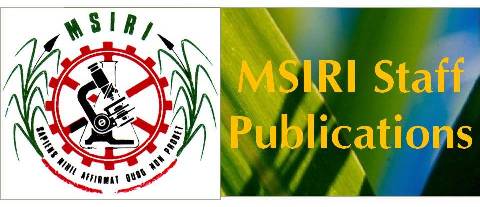Epidemiological studies on Puccinia polysora, its importance and measures adopted for its control in Mauritius
| MSI99P0182 | |
| Autrey, L. J. C. | |
| Epidemiological studies on Puccinia polysora, its importance and measures adopted for its control in Mauritius | |
| Gelaw, B.(ed), Towards self sufficiency. Proceedings of the 2nd Eastern, Central and Southern Africa Regional Maize Workshop, Harare, Zimbabwe, March 15-21, 1987 | |
| Book chapter | |
| 1988 | |
| p. 180-200 | |
| Mexico, D. F., CIMMYT | |
| En | |
| En | |
| Field trials in 1982 and 1985 showed high levels of infection by southern rust, Puccinia polysora, in maize planted in February to April. Comparison of yields from untreated and fungicide-treated plots demonstrated that the disease can reduce yield significantly even when infection is moderate. In UR 22, treated plots yielded 45 per cent more than highly infected untreated plots. Among a large number of single, three-way and intervarietal hybrids bred in Mauritius, only two were found to be resistant to the disease, the others being moderately resistant, susceptible or highly susceptible. Susceptible genotypes, to escape disease, should be planted only as from May. Successive plantings should be avoided. The feasibility of fungicidal control in commercial plantings remains to be evaluated. | |
| MAIZE RUST DISEASES PUCCINIA POLYSORA EPIDEMIOLOGY CONTROL FUNGI FUNGICIDES DISEASES Fungal diseases | |
| MAURITIUS | |
| Maize: Diseases and disease management | |
| Fungal diseases: Rust | |
| 1992-02-13 | |
| En | |
| Mauritius Sugar Industry Research Institute | |
| FC | |
| CAT | |
| 1 | |
| PATH |
